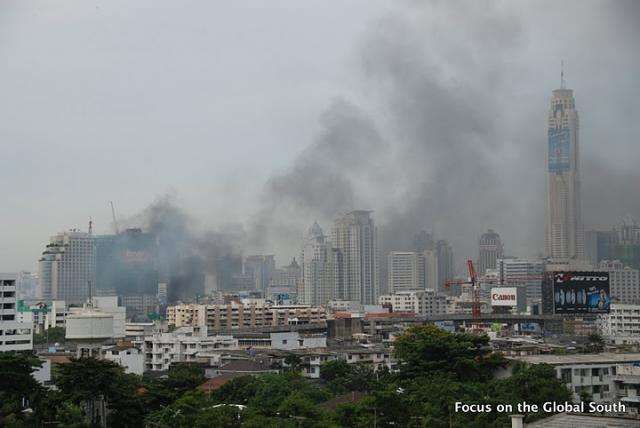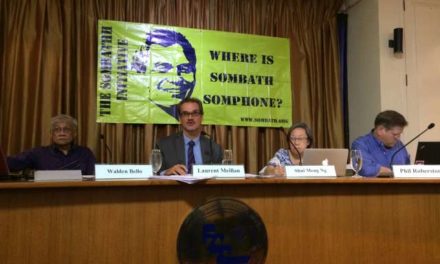by Jacques-chai Chomthongdi and Chanida Chanyapate
As Bangkok residents came out in full force to help clean up the Silom and Ratchprasong areas so that their lives can get back to normal, the government of Abhisit Vejjajiva is also issuing arrest warrants for the remaining Red Shirt leaders and sympathizers to keep them off the streets. The consequences of the 9-week street demonstrations by the United Front of Democracy against Dictatorship, however, will not be so easily swept away. The last word from a Red Shirt supporter on a motorbike passing a truck full of soldiers on their return to barracks was loud and clear: “See you next Songkran”.
As the opposition Puea Thai Party prepared its censure motion against the Prime Minister for his handling of the Red Shirt protesters, who constitute their electoral base, NGOs, academics and civil society groups who had been calling for dialogue and for both the government and the UDD to adopt non-violent means to settle their political conflicts, need to sort out for themselves the facts from fiction, and not least what needs to be done next to ensure Thai society can move forward on a course of popular, representative democracy.
In the end, the Democrat Party chose a short-term solution, a violent crackdown to keep themselves in power a while longer. They thereby showed clearly that they were allied with (or possibly controlled by) the traditional elite establishment. They clearly have blood on their hands.
The military can now claim that they have merely carried out the wishes of the government, like any good army under a democratic system.
The heterogeneous Red masses were mobilized together behind one immediate goal only: the dissolution of parliament. Though well-organized, they were not prepared to consider any other options and did not seem to have thought through different scenarios and the different strategies that these would require; nor did they articulate any long-term political agenda to address the issues of injustice and inequality that they repeatedly brought up.
A feature that distinguished the Red Shirt street protests from past demonstrations was the emergence of an unidentified group of well-armed and well-trained people when the military attempted to remove protestors from Ratchadamnoen Avenue on April 10, resulting in heavy casualties on both sides, including the army’s commanding officer at the scene. Prolonged street protest now had the potential to cause more loss of life.
The UDD leadership were in a position to know this. It could also reasonably be expected that the presence of this armed group would be used by the government to justify the deployment of lethal methods in later confrontations. By making bargaining demands before dispersing the rally, the UDD leadership (or at least some of it, supported by at least some of the protestors) was effectively gambling with the physical safety of their supporters in an increasingly hostile and dangerous environment. The UDD leadership must therefore share responsibility for the bloodshed that occurred, although the greatest responsibility lies with those who carried out and ordered the killings.
Bangkokians who vociferously opposed the UDD demands, either in the streets or on electronic social networks, portray the Red masses as uneducated and ignorant, reflecting clearly the inherent bias in Thai society against giving equal political rights to the less-educated and poorer classes, especially from rural areas. The Bangkok upper and middle classes have condoned the government’s use of force to kill the protesters.
The killings of Red Shirt members and paramedics have stoked tremendous anger and hatred among the Red Shirts and their supporters, while the vengeful burning of properties has turned a lot of non-political Bangkokians against the Red Shirts; the outcome is undoubtedly a deeper social divide fuelled largely by an immediate emotional reaction to the loss of life (by one side) and the loss of property (by the other).
The Abhisit government has to take ultimate legal and political responsibility for the deaths and injuries. No justification can be found for the use of security forces armed with war weapons to disperse demonstrators without first exhausting all other means of ending the conflict, especially when the government had insisted from the beginning that it wanted to find lasting solutions for society. The UDD leaders were still calling for negotiations even at the last minute before troops pushed through their barricades.
The only way forward is for the government to submit itself to the judicial process along with the UDD leaders. Even though social and political reforms are necessary and urgent next steps, the Abhisit government has lost all shred of legitimacy to be the host of this process.
An independent body comprising representatives from all sectors and constituencies needs to be formed to gather evidence from all sides to establish accountability and secure justice. People need to know what happened, and all parties need to acknowledge what happened; this is the necessary first step towards national reconciliation.
If anyone bothered to visit the Red Shirt camp, they would be well versed in the grievances that the UDD supporters brought with them from the Northeastern and Northern provinces. These are the mainstay of the protesters who camped on the streets in the full summer heat all through the 9 weeks of protest.
“Isaan (Northeast) people are fed up with being treated as second class citizens, as though they don’t count. The problem is very simple: the Abhisit government does not represent us; Abhisit was put there by people with power so that they can continue to control the country and the wealth. It’s obvious this Government is not for the poor. The only way to solve this is to dissolve the parliament and have new elections.”
“In the North everything has become too expensive for us — fertilisers, seeds, water, agricultural machinery, food; we have a drought there; the provinces have to share water on a monthly basis. The burden on the rural people is too heavy. Why don’t the rich share this burden?”
“We have no forests left; the weather is getting hotter all the time and agricultural output is falling; all over the country, the resources are going because of mining, deforestation and so on. Those who have the means get richer, but the poor and rural people are just getting poorer.”
For a national reconciliation process to have any effect in the long run, serious attention must be paid to long-existing social and political marginalization, widening gaps in income and opportunity and pro-urban policy biases, which have been exacerbated by rapid global economic integration of urban-oriented business sectors in the past couple of decades.
Whether the UDD as it is currently organized will be able to transform itself into a force for structural change that can take care of these grievances is the big question.
It was apparent that the key demand of the UDD mobilization was for an opportunity for the Thai Rak Thai electoral base to elect its own government and, with the claim by one of the leaders that they number up to 20 million, they felt certain they would succeed.
All questions about what policy agenda they have in mind to resolve their stated socio-economic problems met with a similar statement: “Our hope is that with a democratically elected government, these problems will be solved. We don’t know yet how that will happen, but there is talk among the red leadership about this. We have to take this one step at a time.”
With a dozen UDD leaders taking turns delivering rallying speeches constantly throughout the protest, one never heard any mention of what their pro-poor policies may look like, or any hint of social, economic and political reform measures that could create more equity. There seemed to be a shared absolute faith in the elected politicians to right the wrong, especially the Thaksin Shinawatra model of politician.
Not many people who listened to the speeches realized that the stated aims of the UDD, as written on the back of their membership cards, expressed a desire for “a free capitalist state in which the gap between the rich and the poor is reduced” and that “moves forward with economic progress and with a competitive economic edge on the world stage”. The statement also insisted that they simply “want to free the country and its populations from the hands of the oligarchy and transform it into a country of free people with national pride, freedom and equality”, and no further.
The issues of inequality and injustice flagged by the UDD are basically covered in one of the 5 points of the national reconciliation roadmap proposed by the government, The failure of the UDD leaders to consider the proposal seriously, therefore, was the loss of a great opportunity to secure a proper space and recognition for the participation of the UDD on equal terms with the bureaucracy and other sectors of society in the economic and political reform processes. The latter has already been submitted to parliament by individual MPs and a group of citizens in the form of proposed constitutional amendments.
Whether the UDD will be able to transform itself into a social movement that would constantly challenge elite/oligarchic democracy and contribute to long-lasting social change depends on how the organization has prepared spaces for the emergence of new leadership for the future.
If the struggle persists, there is a possibility that class consciousness among the Red Shirt masses could be concretized independently from Thaksin or other patrons. However, this does not seem to have been the aim of its leaders, at least of the hard-core wing. The strategy, therefore, seemed not to genuinely empower the poor or nurture grassroots organization and mobilization of those who have been politically and economically excluded, but to head directly into a collision in order to overthrow the current establishment, which would almost exclusively benefit Thaksin and his clique.
It would be a positive contribution to Thai society if local UDD groups could channel their energy toward local administration and local elections and the problem of corruption at the local level as well as at the national level. As a way to challenge the hegemony of Bangkok-centred administration, they could work to ensure elected representatives are accountable to their electorates, so that power devolves to sub-national and local levels, where there is the potential for change to happen that directly affects their lives.
Thailand is at a critical social and political juncture, and needs to choose its future path with tremendous care. Trust has broken down so completely on both sides of the divide that any government is likely to find itself on a collision course with one constituency or another.
29 May 2010








